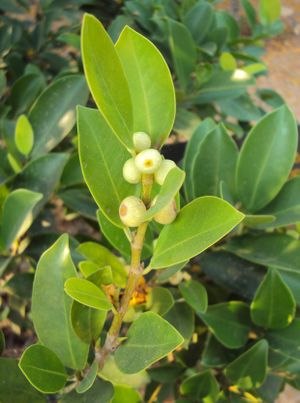Note: This is a project under development. The articles on this wiki are just being initiated and broadly incomplete. You can Help creating new pages.
Difference between revisions of "Ficus microcarpa - Laurel"
| Line 1: | Line 1: | ||
| − | [[File:Ficus microcarpa.jpg|thumb|right | + | [[File:Ficus microcarpa.jpg|thumb|right]] |
| − | |||
'''Ficus microcarpa''' was widely distributed as an ornamental plant and is one of the most common street trees in warm climates. The tree is considered a major invasive species in Hawaii, Florida, Bermuda, Central America, and South America. It's commonly used as a ornamental tree in most of Spain's mediterranean coast, as in the Balearic and the Canary islands. Ficus microcarpa can also be found on the Algarve, the southern coast of Sicily or in Cyprus. In the area of Tel Aviv in Israel is a common ornamental tree.Ficus Microcarpa is a tree species which may grow into 20+ meters tall trees. Alternative names are '''Ficus Retusa''', '''Ginsen ficus''', '''Chinese Banyan''', '''Malayan Banyan''', '''Tigerbark Fig''', '''Indian Laurel''', '''Curtain fig''' and many more.The Ficus microcarpa is very widespread and found in landscapes and as a container tree in many countries of the world. It is used for boulevard trees in many frost free cities. | '''Ficus microcarpa''' was widely distributed as an ornamental plant and is one of the most common street trees in warm climates. The tree is considered a major invasive species in Hawaii, Florida, Bermuda, Central America, and South America. It's commonly used as a ornamental tree in most of Spain's mediterranean coast, as in the Balearic and the Canary islands. Ficus microcarpa can also be found on the Algarve, the southern coast of Sicily or in Cyprus. In the area of Tel Aviv in Israel is a common ornamental tree.Ficus Microcarpa is a tree species which may grow into 20+ meters tall trees. Alternative names are '''Ficus Retusa''', '''Ginsen ficus''', '''Chinese Banyan''', '''Malayan Banyan''', '''Tigerbark Fig''', '''Indian Laurel''', '''Curtain fig''' and many more.The Ficus microcarpa is very widespread and found in landscapes and as a container tree in many countries of the world. It is used for boulevard trees in many frost free cities. | ||
Revision as of 10:03, 12 October 2016
Ficus microcarpa was widely distributed as an ornamental plant and is one of the most common street trees in warm climates. The tree is considered a major invasive species in Hawaii, Florida, Bermuda, Central America, and South America. It's commonly used as a ornamental tree in most of Spain's mediterranean coast, as in the Balearic and the Canary islands. Ficus microcarpa can also be found on the Algarve, the southern coast of Sicily or in Cyprus. In the area of Tel Aviv in Israel is a common ornamental tree.Ficus Microcarpa is a tree species which may grow into 20+ meters tall trees. Alternative names are Ficus Retusa, Ginsen ficus, Chinese Banyan, Malayan Banyan, Tigerbark Fig, Indian Laurel, Curtain fig and many more.The Ficus microcarpa is very widespread and found in landscapes and as a container tree in many countries of the world. It is used for boulevard trees in many frost free cities.
The Ficus microcarpa can be treated like any normal indoor plant, a bright sunny position is recommended, in darker positions stems will elongate. Cut back branches as they get too long or train branches with wire to form shapes. Ficus microcarpa is one the finest trees for indoor bonsai and tolerates a wide range of indoor conditions. It has good bonsai character, lovely gray bark, and superb basal root flare. It tolerates the beginner’s efforts and still makes a superb addition to the advanced bonsai grower’s collection. This plant is used extensively in Feng Shui planning.
